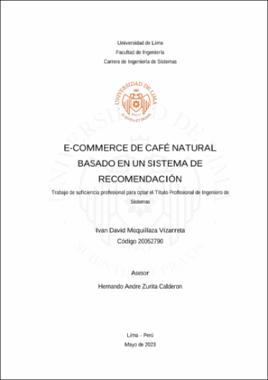| dc.contributor.advisor | Zurita Calderón, Hernando André | |
| dc.contributor.author | Moquillaza Vizarreta, Iván David | |
| dc.date.accessioned | 2023-10-30T15:05:18Z | |
| dc.date.available | 2023-10-30T15:05:18Z | |
| dc.date.issued | 2023 | |
| dc.identifier.citation | Moquillaza Vizarreta, I. D. (2023). E-commerce de café natural basado en un sistema de recomendación [Trabajo de suficiencia profesional para optar el Título Profesional de Ingeniero de Sistemas, Universidad de Lima]. Repositorio Institucional de la Universidad de Lima.
https://hdl.handle.net/20.500.12724/19146 | es_PE |
| dc.identifier.uri | https://hdl.handle.net/20.500.12724/19146 | |
| dc.description.abstract | Nowadays, coffee is one of the main agricultural products that Peru exports to the main international markets; despite this, national consumption is incipient and in preference to imported coffee. In recent years, there has been an increase in the consumption of natural coffee due to specialty coffee shops and the high-value formats that they offer. However, in the field work, it was identified that consumers seek to take home the experience of these cafeterias, have options to choose the coffee that best suits their tastes and avoid buying standard products - dark roast coffee and medium grinding - that are sold in supermarkets.
For this reason, the present work seeks to revalue national coffee, contributing to the dissemination of Peruvian coffee varieties, the promotion of its consumption, the protection of coffee farms and the strengthening of communities; in order to avoid the eradication of coffee plantations and their conversion to coca leaf plantations. In this sense, technology will be the pillar on which the business model will be built, which seeks to provide the customer the experience of a specialty cafeteria and offer products in a personalized and timely way. For this, the Design Thinking methodology was used, to understand the client's needs and prototype possible solutions; Likewise, the Scrum methodology and the Rapid Miner tool were used to develop the Operating Plan, Financial Plan, Recommendation System and Monitoring Dashboard. The use of the FP-Growth algorithm for the creation of the rules of the recommendation system is highlighted. Finally, the use of technology in the coffee ecosystem is expected to boost its consumption and create a new business mode. | es_PE |
| dc.description.abstract | Actualmente el café es uno de los principales productos agrícolas que el Perú exporta a los principales mercados internacionales; a pesar de ello, el consumo nacional es incipiente y con preferencia al café importado. En los últimos años se ha notado un incremento en el consumo de café natural debido a las cafeterías de especialidad y los formatos de alto valor que estas ofrecen. Sin embargo, en el trabajo de campo, se identificó que los consumidores buscan llevar a casa la experiencia de estas cafeterías, tener opciones para elegir el café que más se adecue a sus gustos y evitar adquirir productos estándares – café tostado oscuro y molienda media – que se comercializan en los supermercados.
Por tal motivo, el presente trabajo busca revalorar el café nacional, contribuyendo con la difusión de las variedades del café peruano, el fomento de su consumo, la protección de las fincas cafetaleras y el fortalecimiento de las comunidades; a fin de evitar la erradicación de las plantaciones de café y su conversión plantaciones de hoja de coca. En ese sentido, la tecnología será el pilar en el que se construirá el modelo de negocio, el cual busca brindar al cliente la experiencia de una cafetería de especialidad y ofrecer los productos de manera personalizada y oportuna. Para ello, se utilizó la metodología Design Thinking para entender la necesidad del cliente y prototipar las posibles soluciones; asimismo, se usó la metodología Scrum y la herramienta Rapid Miner para desarrollar el Plan Operativo, Plan Financiero, Sistema de Recomendación y Dashboard de Seguimiento. Se destaca el uso del algoritmo FP-Growth para la creación de las reglas del sistema de recomendación. Por último, se espera que el uso de la tecnología en el ecosistema del café potencie su consumo y cree nuevos modelos de negocios. | es_PE |
| dc.format | application/pdf | |
| dc.language.iso | spa | |
| dc.publisher | Universidad de Lima | |
| dc.rights | info:eu-repo/semantics/openAccess | * |
| dc.rights.uri | https://creativecommons.org/licenses/by-nc-sa/4.0/ | * |
| dc.source | Repositorio Institucional - Ulima | es_PE |
| dc.source | Universidad de Lima | es_PE |
| dc.subject | Café | es_PE |
| dc.subject | Comercio electrónico | es_PE |
| dc.subject | Sistemas de recomendación (Filtrado de información) | es_PE |
| dc.subject | Coffee | es_PE |
| dc.subject | Electronic commerce | es_PE |
| dc.subject | Recommender systems (Information filtering) | es_PE |
| dc.title | E-commerce de café natural basado en un sistema de recomendación | es_PE |
| dc.title.alternative | Natural coffee e-commerce based on a recommendations system | en_EN |
| dc.type | info:eu-repo/semantics/bachelorThesis | |
| thesis.degree.level | Título Profesional | es_PE |
| thesis.degree.discipline | Ingeniería de Sistemas | es_PE |
| thesis.degree.grantor | Universidad de Lima. Facultad de Ingeniería y Arquitectura | es_PE |
| dc.publisher.country | PE | |
| dc.type.other | Trabajo de suficiencia profesional | |
| thesis.degree.name | Ingeniero de Sistemas | es_PE |
| renati.advisor.orcid | https://orcid.org/0000-0003-0445-4424 | |
| renati.discipline | 612076 | |
| renati.author.dni | 42747753 | |
| renati.level | https://purl.org/pe-repo/renati/level#tituloProfesional | * |
| renati.advisor.dni | 45599997 | |
| renati.juror | Raygada Vargas, Luis Armando | |
| renati.juror | Palacios López, Enrique Humberto | |
| renati.juror | Francisco Martín, Riccio Chávez | |
| renati.juror | Zurita Calderón, Hernando André | |
| renati.type | https://purl.org/pe-repo/renati/type#trabajoDeSuficienciaProfesional | * |
| dc.subject.ocde | https://purl.org/pe-repo/ocde/ford#2.02.04 | |
| ulima.cat | 15 | |





